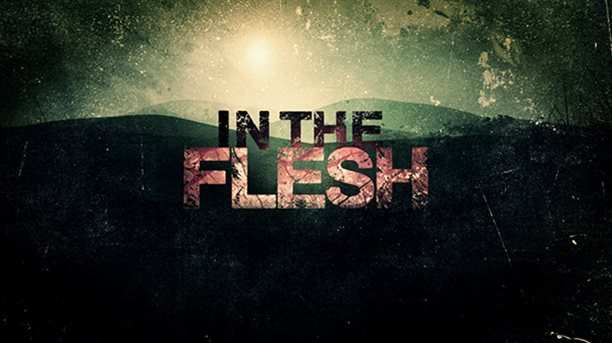#RenewInTheFlesh
“I am a Partially-Deceased Syndrome sufferer and what I did in my untreated state was not my fault.”
This is what the risen undead of Dominic Mitchell’s post-zombie-apocalypse world are made to repeat as they go through rehabilitation at special treatment centres. As they return to their communities, these former zombies face prejudice, stigma and the struggle to ‘pass’ as human using thick make-up and contact lenses. Dealing with the aftermath of apocalypse through the eyes of the (mostly) remorseful revenants and their families, In The Flesh, starring Luke Newberry (Anna Karenina, The Legend of Hercules, Banana) is no ordinary zombie drama. Tackling themes of homosexuality, suicide, grief and mental illness (even featuring a sinister version of UKIP, the ‘pro-life’ Victus), Mitchell’s drama eschewed every stereotype and resonated with thousands of viewers across the world. Yet, despite gathering a massive fanbase over just nine episodes – not to mention winning two BAFTAS and an RTS Award, and being voted Best Show of 2014 by readers of the Radio Times – this month BBC Three announced that In the Flesh was to be axed.
As the channel prepares to move entirely online in the autumn of 2015, under pressure from a slashed budget and increased costs, it has narrowed down its programming. Many of its shows have transferred to BBC One and Two, including Backchat and Russell Howard’s Good News. In a statement on Twitter on 16 January, BBC Three declared it only has budget for one original drama per year, and has had to ‘make hard choices to bring new shows through and create room for emerging talent’. Five days later, it announced the drama that would be taking its place: Thirteen, Marnie Dickens’ psychological series about a young woman returning to her family after being imprisoned in a cellar for thirteen years. Thirteen follows in the footsteps of In The Flesh, as another original drama penned by a new writer, yet many are disappointed that the latter had to be lost to allow Thirteen to emerge.
BBC Three has had to ‘make hard choices to bring new shows through and create room for emerging talent’
BBC Three may have dropped the programme, but there are legions of fans campaigning for it to be, ahem, resurrected. Petitions for Amazon Prime and Netflix to continue the story have attracted tens of thousands of signatures, and the #RenewInTheFlesh hashtag is filled with rallying cries, messages of support and photos of cosplay and fanart. Most recently, admirers have been scattering five-star reviews on In The Flesh’s online box set page on Amazon Prime, in a not-so-subtle hint to the corporation demonstrating the show’s popularity. The chat system on Netflix has been bombarded with people making individual pleas to the provider, as has Amazon’s customer services instant-messenger. This may be the campaign’s most effective strategy; following an online fight by its fans, Victorian crime drama Ripper Street was taken on by Amazon Prime after its cancellation by BBC One. The In The Fleshdom’s efforts swiftly attracted the Amazon’s attention, as earlier this month, a representative for the company told the Radio Times that its Twitter feed had been “buzzing” thanks to the “ardent fan base”.
If the campaign succeeds and In The Flesh is picked up by another network or an on-demand provider, it will be a resounding victory for the show’s fans and the power of social media. The programme itself is incredibly important, providing a relatively rare Northern voice for television and portraying crucial issues sensitively and masterfully – it is a grim loss for the BBC. The last episode left a tantalising cliffhanger and many story lines yet to be explored, proving that In The Flesh has plenty of life left.

Comments